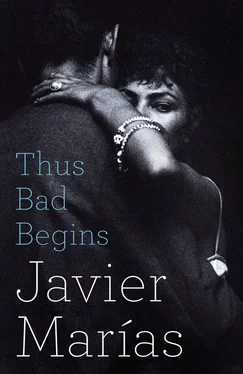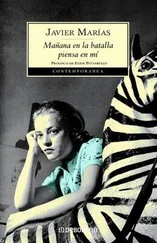And so I went back to the apartment to wait. There was no way I could know for sure, unless I ventured into the foyer, and that, I had decided, would be a mistake.
As arranged, Muriel arrived at eight fifteen, along with the former Phantom of the Opera, Goldfinger’s mistress and victim, and Lisa Raines, the future Fanny Hill in another Towers film. From my room, I heard Muriel ask the girls and Flavia where Beatriz was, clearly puzzled not to find her there.
‘She wasn’t here when we got back from school,’ said Susana.
‘She went out,’ said Flavia. ‘She should be back soon.’
‘What time did she go out?’ he asked.
‘Shortly before six.’
‘Did she say where she was going?’
‘No, just that she’d be back in time for supper. But don’t worry, everything’s ready.’
‘She’s probably gone to the hairdresser’s or something,’ Muriel said. ‘And where is young De Vere?’ He tended to call me ‘young De Vere’ rather than ‘Juan’, both when addressing me and when referring to me, just as he called Rico ‘the Professor’ and Van Vechten ‘the Doctor’.
‘He’s in his room.’
‘I’ll go and fetch him. I’ve brought him a young beauty of his own age for him to entertain.’
The bedroom beyond the kitchen, where I had slept the first time I stayed in the apartment, had become ‘my room’, and it was no longer seen as unusual for me to sleep there. I preferred not to appear just at that moment, so that Muriel wouldn’t ask me directly about Beatriz and so that I wouldn’t have to lie to him. Not telling him what I had seen with my own eyes, for example in the Sanctuary, was not the same as saying: ‘I’ve no idea where she’s gone. She left without saying goodbye.’ Even though that last part would have been true. I thought with some irritation: ‘A young beauty of my own age indeed. What is Muriel talking about? Obviously all young people look the same to him.’ As Lisa Raines was about sixteen or seventeen, she really was an apprentice; for me, at twenty-three, she was almost as much of a baby as Susana.
Since Muriel had to look after the guests he had brought with him, he didn’t come to demand my presence immediately. However, after four or five minutes, the doorbell rang and he strode over to my room and, without looking in, called:
‘Young De Vere, would you mind opening the front door? Flavia’s got things to do and Beatriz isn’t back yet. And the young Raines girl may already be getting bored. Come and keep her company and stop sulking. Just because you haven’t got a place at the table doesn’t exempt you from being helpful. And you never know, we may end up making room for you, but that will depend on whether the young prodigy approves of you or not.’
I left my room at once, and saw him walk down the corridor and into the living room, while I went to the front door. The bell rang impertinently several more times, Rico had arrived with Towers and Wheeler (now that I think of it, Rico wasn’t very eager to please them either, although he made an exception for Muriel and Beatriz, whenever he got the chance to enjoy their company: I think the only reason he had agreed to play the part of chauffeur was because he wanted to meet the illustrious Oxford Hispanist, to whom he was chatting away in Spanish, completely ignoring the producer and his wife). I ushered them all into the living room and, shortly afterwards, the couple from the British embassy arrived too, all the foreigners observing relative punctuality. I repeated the same operation and, six or seven minutes later, the person ringing the bell was Van Vechten with his inevitable rectangular smile, and I wondered if Lom would notice his resemblance to Robert J. Wilke, with whom he had appeared in Spartacus . When Van Vechten came in and saw everyone there, he remarked in smug, stiff, mediocre English, like a Spanish TV presenter:
‘Oh dear, I must be the last. So sorry to keep the distinguished guests waiting.’ He gave an anachronistic click of his heels and introduced himself to the assembled company. ‘Dr George Van Vechten,’ he said, absurdly translating his own name from ‘Jorge’ to ‘George’.
The truth is that no one was waiting for him, none of the foreigners had even heard of him, and the only guest who did know him, Rico, had seen him dozens of times before, and, as far as he was concerned, Van Vechten was just another shape coming and going in Muriel’s motley apartment.
‘No, you’re not the last, Doctor,’ my boss said in Spanish, then as an aside: ‘Beatriz is missing. It’s really very odd that she shouldn’t be here.’ And he looked at his watch. ‘Have you by any chance heard from her today?’
Van Vechten responded defensively, although only I would have noticed:
‘No, why would I?’
Then Muriel turned to me. With all the comings and goings of people and languages, I had escaped being interrogated on the subject until then. It was gone nine o’clock and the motley English contingent and their companions were beginning to flag.
‘And what about you, young De Vere, do you know anything?’
No, I couldn’t tell Muriel a lie, I could, at most, tell him a half-lie, enough to cover myself.
‘I’m not sure. I popped out earlier to run a couple of errands and happened to see her going into the Wellington. I was on the opposite side of the street. But that was quite some time ago, at around six.’
Muriel’s one eye rested with a look of alarm and incredulity on my two eyes, as if I had just acted a scene only he could understand, perhaps because he already knew it, perhaps because he had a more penetrating visual imagination than most. For a fraction of a second, he closed his eye, as if with tedium or weariness, anticipating the labour involved in some future task or in his vision of events. Or as if gathering all his strength and patience and allowing himself time to think before taking action: ‘I’m going to have to deal with it all over again. Or maybe I’ll never have to deal with it ever again.’
‘At the Wellington? The Hotel Wellington? But why didn’t you so say so before?’
He said this so loudly and in such a tremulous voice that the guests’ murmured conversations ceased at once and they all looked at him, concerned or uncomprehending. Professor Peter Wheeler was the only one of the foreigners present who knew Spanish perfectly, but the couple from the embassy understood too, even though they had not long been in Madrid.
‘I don’t know, Eduardo, you didn’t ask me. What’s wrong? What does it matter? That was hours ago. It never occurred to me to mention it,’ I stammered, already feeling guilty of some grave fault, although I had no idea what.
But Muriel hadn’t really expected an answer to his question: I don’t even know if he heard what I said.
‘Quick, Jorge,’ he said to Van Vechten. ‘You come too, Juan.’ Then he turned to Rico and said: ‘Paco, please, keep our guests entertained, will you, and invent some explanation. We may have to cancel supper, I’m not sure. I’ll let you know as soon as possible, or else I’ll send Juan.’
This time, he called all three of us by our proper names, which meant that there was no room for so much as a hint of a joke, as there normally was when he was surrounded by his usual spectators and accomplices, of whom I was now one. He only had room in his mind now for anxiety and a deadly seriousness.
I had never seen Muriel run any distance at all. ‘Running is undignified, young De Vere,’ he had said to me once, telling me off after seeing me race for a taxi when the lights were about to change, or when he saw other people, either painfully struggling or brimming with health, as they engaged in what at the time we Spaniards called footing — as a nation, we are as useless at languages in general as we are eager to adopt foreign terms we can neither understand nor pronounce. As I say, I had never before seen him run and I don’t think I’ve ever seen anyone run as swiftly and desperately as he did, covering the few metres between his house and the Hotel Wellington in no time at all, so at least the indignity lasted only briefly, and besides, in such an extreme situation, that would have been the last thing on his mind. He ran so fast for a man of fifty — jacket flapping open, its tails and his tie flying like flags — that even I, at half his age, would have been unable to keep up with him for another two hundred metres, and Dr Van Vechten certainly wouldn’t, for despite all those hours spent working out in gyms, he was still a good ten years older than Muriel. However, the distance between house and hotel was so short that all three of us arrived pretty much at the same time, with Muriel at the head, of course, not only because he was running as if the devil himself were after him — an expression used and understood by everyone, even though no one has ever actually seen the devil — but because he knew why he was running and what he had to do. During that brief race, I also guessed what had happened, as doubtless Dr Van Vechten had, if he hadn’t done so earlier: Muriel wasn’t afraid that Beatriz had forgotten the time or that supper had completely slipped her mind because she was too consumed by her needs or her passions or her sexual appetites — a regular lover, the manager perhaps; a guest, maybe Baringo Roy, our friend Roy’s extraordinary Andalusian cousin; a bellboy or a casual waiter, or whoever — I don’t think he even imagined such a scene; what he imagined was what I had entirely failed to notice when I was trying to peer into the hotel foyer: Beatriz must already have reserved a room, perhaps that very morning or even the previous night, which is why she hadn’t had to go to reception to pick up her key or fill in a form; they would have handed her the key as soon as she appeared or she would have had it with her, depending on the hotel rules; she would have gone up to the room whose window she had stopped to gaze up at from the street, already imagining herself inside it, like someone contemplating her own coffin; she would have ordered something to drink or plundered the minibar and begun swallowing pills, lying on the bed, barefoot, possibly in her underwear so as to be more comfortable and with the television on so as to feel less alone, to see faces that would not see her or be able to intervene, to hear voices in the background to make more bearable the transition from being in the world to ceasing to be in the world — that irreversible transformation — just as children fall asleep more easily to the distant murmur of conversation between their parents and a guest, if there is one: as if they were lingering for a while in the waking, adult world they are reluctant to leave, not yet, not yet. The moon would not have been present, or perhaps Beatriz would have waited to see it rise — still very pale, still intimidated by the late-setting sun — so as to die in the dim glow of its deathly pallor.
Читать дальше












